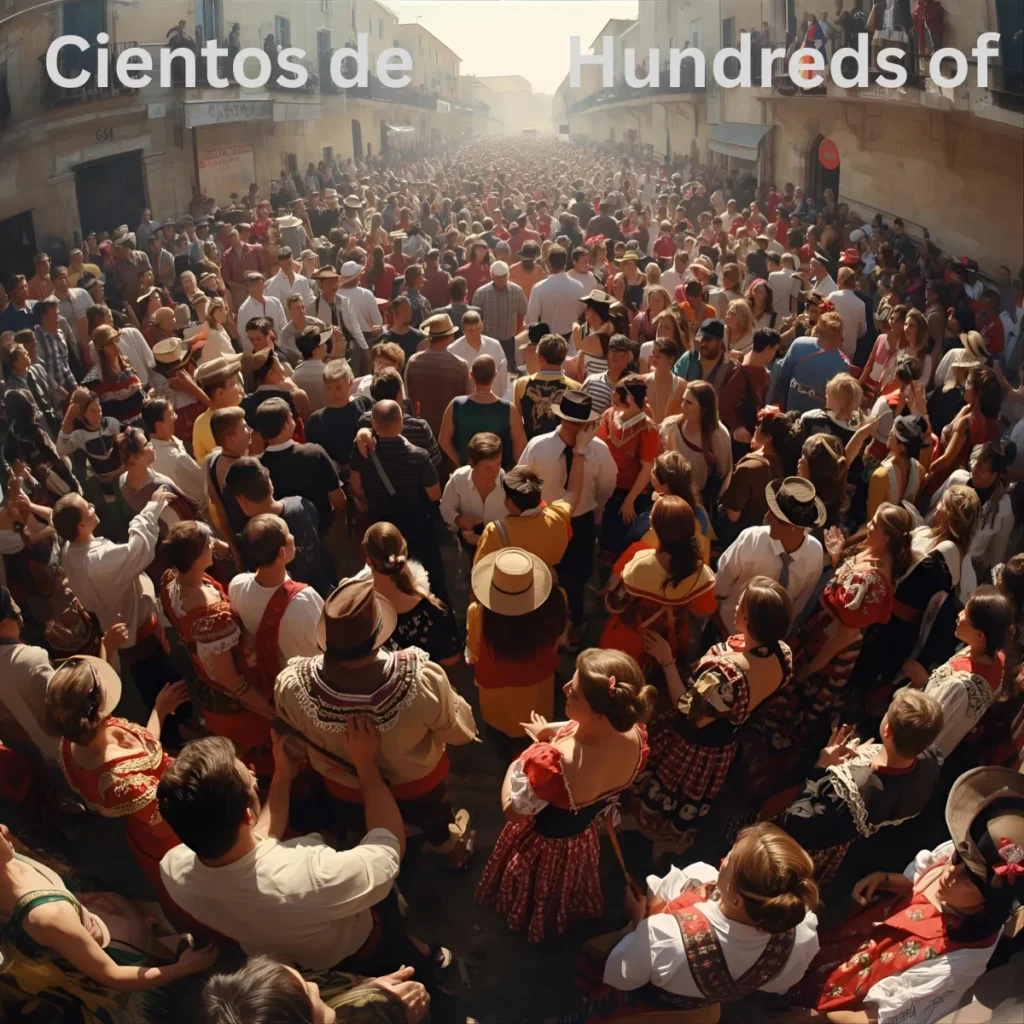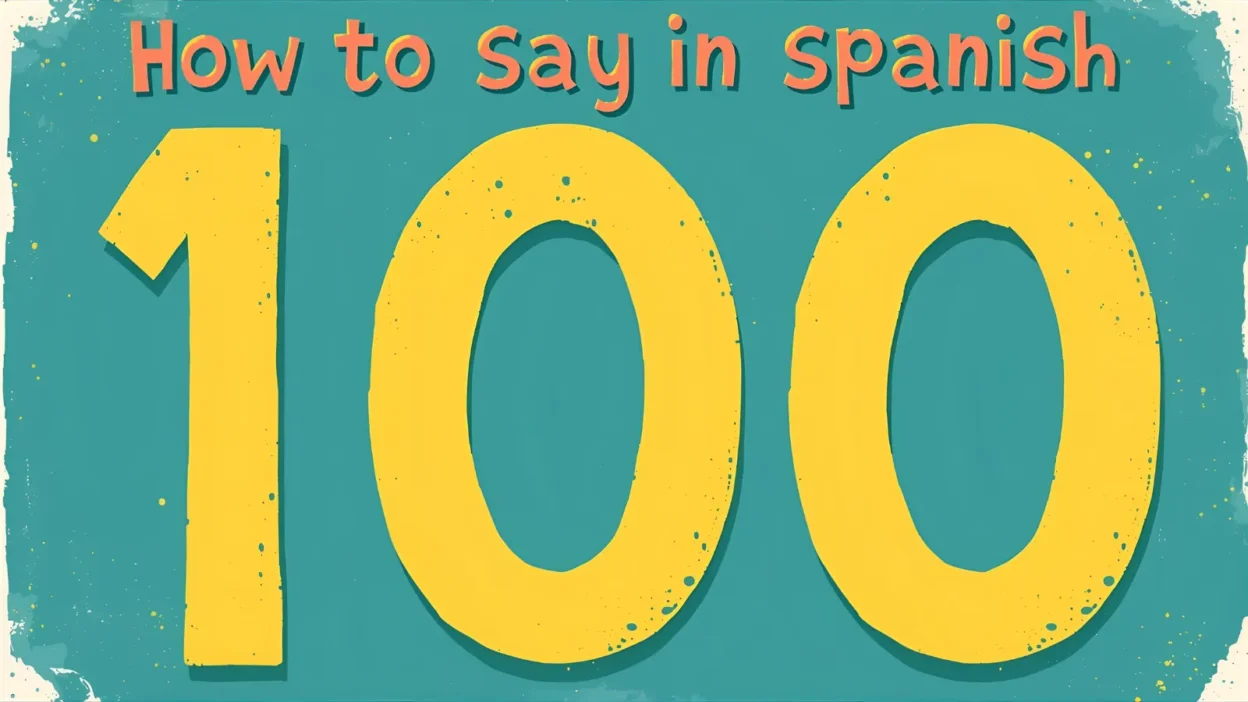Learning how to say 100 in Spanish is an essential step in understanding numbers and everyday conversations. The word for 100 is “cien”, but it changes to “ciento” when used before other numbers, like ciento uno (101). Knowing these forms will help you with counting, shopping, and speaking naturally in Spanish.
Mastering numbers also gives you confidence in situations like travel, money exchange, or telling time. With practice, you’ll be able to use cien and ciento correctly in any context.
Say 100 in Spanish
Let’s break it down clearly with real conversations, grammar tips, and fascinating facts about the number cien.
📊 15 Ways to Say 100 in Spanish (and Beyond)
| # | English Number / Phrase | Spanish Translation |
|---|---|---|
| 1 | 100 | Cien |
| 2 | 101 | Ciento uno |
| 3 | 102 | Ciento dos |
| 4 | 110 | Ciento diez |
| 5 | 120 | Ciento veinte |
| 6 | 150 | Ciento cincuenta |
| 7 | 199 | Ciento noventa y nueve |
| 8 | 200 | Doscientos |
| 9 | 300 | Trescientos |
| 10 | 400 | Cuatrocientos |
| 11 | 500 | Quinientos |
| 12 | 600 | Seiscientos |
| 13 | 700 | Setecientos |
| 14 | 800 | Ochocientos |
| 15 | 900 | Novecientos |
1. Cien – The Basic “100”

Origin:
“Cien” is the Spanish word for exactly 100. It comes from Latin centum, just like “century” or “centimeter.”
Example:
👤 User A: ¿Cuántos libros compraste?
👤 User B: Compré cien libros.
Use: Use “cien” when saying exactly 100 before a noun.
2. Ciento – When 100 Is Part of a Larger Number
Origin:
“Ciento” is the form of 100 used before other numbers (like 101, 125, etc.).
Example:
👤 User A: ¿Cuántos estudiantes hay?
👤 User B: Hay ciento veinte estudiantes.
Use: Say “ciento” for numbers from 101–199.
3. Cien por ciento – 100 percent

Origin:
Directly translates to “100 percent.” Often used in business, stats, or emphasis.
Example:
👤 User A: ¿Estás seguro?
👤 User B: ¡Cien por ciento seguro!
Use: For expressing certainty, math, or percentages.
4. Un ciento – A group of 100
Origin:
Used in older or poetic Spanish to refer to “a hundred” of something as a group.
Example:
👤 User A: ¿Cuántos soldados había?
👤 User B: Un ciento, marchando en fila.
Use: Formal, poetic, or historical writing.
5. Cientos de – Hundreds of

Origin:
This plural form of “ciento” means hundreds of and is often used for exaggeration.
Example:
👤 User A: ¿Cuántas personas vinieron?
👤 User B: ¡Cientos de personas!
Use: Informal, dramatic emphasis.
6. Número cien – Number 100
Origin:
Used to label or identify something as the 100th in a series.
Example:
👤 User A: ¿Cuál es tu número de la suerte?
👤 User B: El número cien.
Use: Used in addresses, competitions, IDs, etc.
7. Cien dólares – 100 dollars

Origin:
Used in commerce and currency.
Example:
👤 User A: ¿Cuánto cuesta?
👤 User B: Cien dólares exactos.
Use: Common in money-related contexts.
8. Cien años – 100 years
Origin:
Used in age, history, and celebrations.
Example:
👤 User A: ¿Cuántos años tiene la abuela?
👤 User B: ¡Tiene cien años!
Use: Very common for talking about age or anniversaries.
9. La centena – The hundred (mathematical term)
Origin:
“Centena” is a noun meaning a group of 100, often used in schools or accounting.
Example:
👤 User A: ¿Cuántas centenas hay en 400?
👤 User B: Cuatro centenas.
Use: Educational or technical term.
10. Cien veces – 100 times
Origin:
Used in exaggeration or emphasis, often in storytelling.
Example:
👤 User A: ¿Has visto esa película?
👤 User B: ¡Cien veces!
Use: Expresses repetition or emotion.
11. Ciento uno – 101
Origin:
A direct follow-up of “ciento.” “Ciento uno” is the correct way to say 101.
Example:
👤 User A: ¿Cuál es el número después de cien?
👤 User B: Ciento uno.
Use: For counting past 100.
12. Los cien – The 100 (as a group or title)
Origin:
Sometimes used as a collective or formal reference, like a team name or list.
Example:
👤 User A: ¿Viste “Los cien” en Netflix?
👤 User B: Sí, es una serie de ciencia ficción.
Use: Titles, TV shows, group labels.
13. Primeros cien – First hundred
Origin:
Used to refer to the first group in a series (students, guests, items).
Example:
👤 User A: Solo los primeros cien ganan premio.
👤 User B: ¡A correr entonces!
Use: Marketing, competitions, rewards.
14. Ciento por uno – 100-fold
Origin:
Biblical or literary phrase meaning multiplied greatly.
Example:
👤 User A: Esta inversión dio ciento por uno.
👤 User B: ¡Impresionante!
Use: Religious texts, business metaphors.
15. Cien mil – 100,000
Origin:
Combines “cien” (100) with “mil” (thousand).
Example:
👤 User A: ¿Cuántos seguidores tienes?
👤 User B: ¡Cien mil!
Use: Common in counting large numbers (money, followers, population).
FAQs
1. What is the word for 100 in Spanish?
The word for 100 is cien.
2. When do I use “ciento” instead of “cien”?
Use cien when 100 stands alone, and ciento when it is followed by another number, like 101, 150, etc.
Example: ciento veinte (120)
3. How do I say 101 in Spanish?
101 = ciento uno
4. How do I say 150 in Spanish?
150 = ciento cincuenta
5. Is there a plural form for 100?
No, cien does not change to plural.
6. How do I say 100% in Spanish?
100% = cien por ciento
7. How do I say “a hundred people” in Spanish?
You say cien personas.
8. Is “cien” pronounced like English?
No, it is pronounced like “syen” (soft and quick).
9. How do I say “hundreds” in Spanish?
The general word is cientos (like saying “hundreds” in English).
10. Is “cien” formal or informal?
It is neutral — you can use it in both formal and informal situations.
Conclusion:
Learning how to say 100 in Spanish helps you master not just one number but also the rules for building larger numbers. From cien to ciento, knowing when to use each form will make your Spanish more accurate, natural, and confident in everyday conversations.

Liam Bennett is a dedicated content writer who creates clear, engaging, and well-structured articles.
He focuses on delivering practical information that is easy for readers to understand and apply.
Liam Bennett currently writes high-quality content for repliesnest.com, ensuring clarity and reliability.



